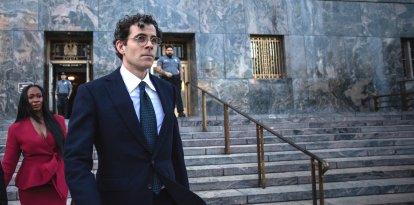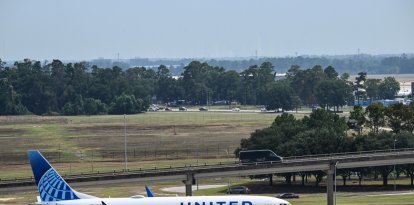Newsom's progressive laws pushing companies to flee California
Legislation aims to protect cannabis users despite the fact that it has been proven that ingesting cannabis can affect work performance.

(Cordon Press)
Governor Gavin Newsom's anti-business freedom bills in California are pushing businesses to flee the Golden State.
According to Bloomberg, Newsom is pushing for legislation that includes progressive employment proposals and gives more responsibility to employers, who say that - while still recovering from the consequences of the pandemic - they can no longer bear the "legal uncertainty" of these measures. Others range from expanding salary transparency and providing protection for employees who use drugs.
Law that includes "salary transparency."
SB 1162 is a wage transparency measure that will require nearly 200,000 businesses with 15 or more employees to disclose employers' hourly wage ranges - broken down by job category, race and gender - in their job postings beginning next year. Previously, owners only had to do so upon request. This measure could lead to claims of bias, as it could reveal wage discrepancies.
Failure to comply with the salary disclosure provision may result in a penalty of $100 to $10,000 for each violation.
The new laws will also provide protection for cannabis users - despite the fact that it is known that ingesting cannabis can affect work performance. - The National Federation of Independent Business (NFIB) and other business groups are opposed the measure, refuting the law's protections for cannabis users as if it were a civil right. For John Kabateck, NFIB state director:
Senate Bill No. 1162/ California by Voz Media on Scribd
Regulating the fast food industry
Newsom also recently signed legislation to intervene in, and regulate the fast food industry. AB 257 allows for the creation of the 'Fast Food Council', composed of 10 members appointed by state officials, who will set the standards for minimum wages, hours and working conditions in the sector, i.e., a control over the free market.
Companies such as McDonalds asked their franchisees to send letters to legislators to vote against the law. Otherwise, the company could stop expanding in California and even leave the state altogether.
Crime in California
Numerous companies have fled major cities like Los Angeles and San Francisco due to increased crime. New "criminal justice reform" laws - imposed by progressive officials - are driving up the number of criminal acts such as shoplifting.
El Dorado County District Attorney Vern Pierson, noted that state legislation such as Proposition 47 and Proposition 57, undermines property rights and gives a free hand to theft and other crimes with minimal punishments: "we have this increase in lawlessness that comes from the perception that I can take other people's property because nothing will happen to me."
The prosecutor commented that some establishments or businesses fail to report thefts because the police "cannot do much." In addition, the propositions protect criminals to such an extent that a suspect has the right to sue a store if the store owner wants to defend his employees at the time of the robbery or assault:
An analysis conducted by the Public Policy Institute of California revealed how the implementation of Proposition 47 incentivizes property crime, the stats show that thefts of personal property has grown 9% between 2014 to 2016. With respect to the consequences of Proposition 57, the institute reported an increase in the number of property crimes last year in four of the state's largest cities: Los Angeles, Oakland, San Diego and San Francisco.
High taxes and misery
California's decline as one of the country's leading states and the high cost of living is also causing companies to leave for other territories. Amazon announced a few months ago the suspension of plans to build and open new warehouses. In an article published in the Hoover Institution called "Amazon No Longer Considers California the Golden State" they attribute the online shopping giant's flight due to "high business costs and an unfavorable regulatory environment."
Another scenario occurred in the Castro District, where small business owners sent a letter to San Francisco city officials in which they said they plan to stop paying the high taxes if the city does not do more to address the growing problems of crime, drug use, homelessness and cleanliness.

























